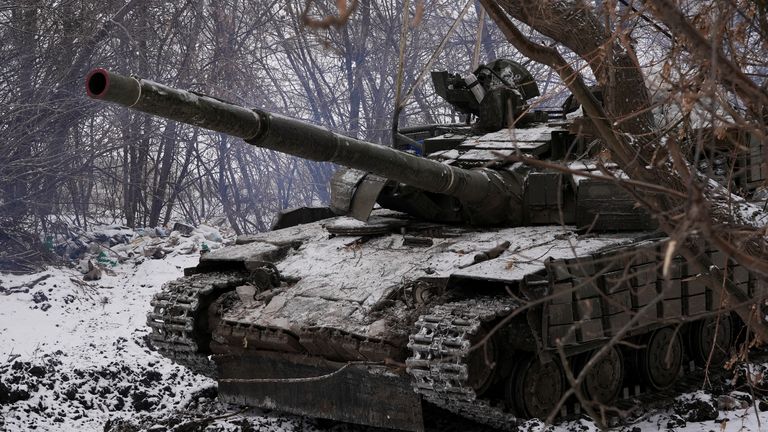What could happen if Russia wins war in Ukraine?
The Institute for the Study of War thinktank says the costs of allowing Russia to win in Ukraine are "higher than most people imagine", as US resolve - particularly among Republicans - possibly wavers over providing more military aid to Kyiv.
A "battered but triumphant" Russian army amassing on NATO's borders, posing a major military threat to the alliance for the first time in three decades? according to Sky News.
That's what could happen if the United States cut off military aid to Ukraine and Europe followed suit, according to a prominent thinktank.
Republicans in Washington have been holding up new funds for Kyiv over demands for border control, leading to concerns over the reliability of American support.
Ukraine war latest: Moscow issues nuclear testing threat to US
Things look particularly tremulous in the context of 2024: a presidential election where the presumed challenger Donald Trump is poised to abandon both Ukraine and NATO.
The Institute for the Study of War (ISW), a thinktank based in Washington DC, has looked at possible scenarios that could arise.
It argues that the US has a "much higher stake" in the war than most people think.
"A Russian conquest of all of Ukraine is by no means impossible if the United States cuts off all military assistance and Europe follows suit," ISW writers say in their new report: The High Price of Losing Ukraine.
"Such an outcome would bring a battered but triumphant Russian army right up to NATO's border from the Black Sea to the Arctic Ocean."
They say that Ukraine - with Western support - has destroyed nearly 90 per cent of the Russian army that invaded in February 2022, according to US intelligence sources.
But despite these terrible casualty numbers, Russia has replaced them and is ramping up its industrial base to replenish its material losses.
A victorious Russian army at the end of the Ukraine war, the ISW says, would be combat experienced and considerably larger than its pre-2022 forces.
Moscow's economy would "gradually recover as sanctions inevitably erode" and its military would rebuild its coherence "drawing on a wealth of hard-won experience fighting mechanized warfare".
It added: "It will bring with it advanced air defence systems that only American stealth aircraft - badly needed to deter and confront China - can reliably penetrate.
"Russia can pose a major conventional military threat to NATO for the first time since the 1990s in a timeframe set to a considerable extent by how much the Kremlin invests in its military."
The ISW argues NATO's military potential is much greater than that of Russia - even if it fully absorbs Ukraine and Belarus.
But, it says, the costs of allowing Russia to win in Ukraine are "higher than most people imagine".
The ISW argues:
• The US would have to deploy a "sizeable portion" of its ground forces to eastern Europe
• The US could face a "terrible choice" between keeping enough stealth aircraft in Asia to defend Taiwan and stationing them in Europe to support allies against any Russian aggression.

The thinktank's report says: "Helping Ukraine keep the lines where they are through continuous Western military support is far more advantageous and cheaper for the United States than allowing Ukraine to lose."
A ceasefire that "freezes" the conflict would give Russia time and space to prepare for a new war, it adds
The more territory Ukraine is able to regain, the further to the east it would push the Kremlin's forces.
Best of all, the ISW says, would be supporting Ukraine to victory and then helping it rebuild.
This would put the "largest and most combat-effective friendly military on the European continent" at the forefront of NATO's defence, according to the thinktank.
"A victorious Ukraine would not be a permanent ward of the West," it says, arguing that restored to its 1991 borders its economy is big enough to support its own military.








